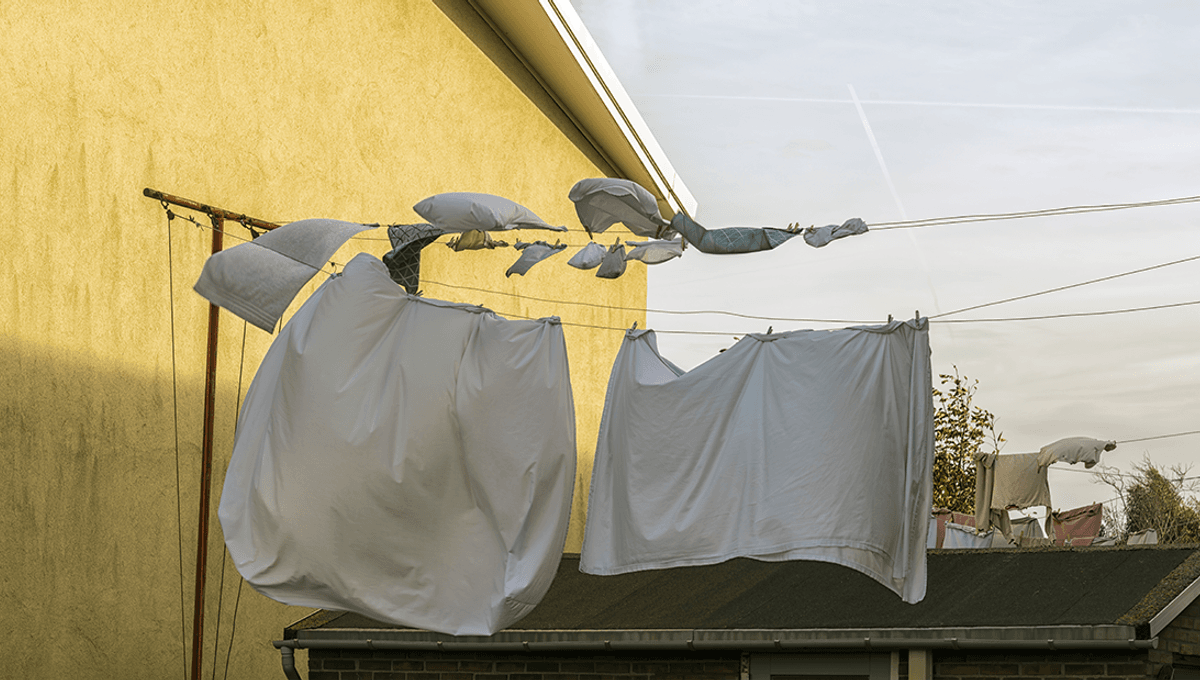
A while back, we brought you the story that people have been advised to put bowls of salt in their windows for (somewhat dubious) reasons. Well, it turns out there is yet another winter trend for you to try out: airing your blanket out in the freezing cold.
According to those who do it, the practice either kills bacteria (which sounds plausible, even if it isn’t entirely correct), kills “bad energy” (which doesn’t), or promotes better sleep.
“I swear by the sleep hack of hanging out your duvets to air,” Cecilia Blomdahl, a TikTok influencer from Svalbard, a Norwegian archipelago between mainland Norway and the North Pole, explained in a TikTok video.
“I got it from my mama. Hanging out your duvets to air is a very common thing in Scandinavia, and probably other parts of the world, as well,” she added.
“The main goal is just to refresh your bedding, and it really makes it fresh and airy. But the secondary is that it can actually help improve your sleep quality. When we sleep, we sweat, and we breathe, and that moisture gets trapped in our bedding. So when you hang out your duvet, it can actually help get rid of that moisture.”
She goes on to add that if you don’t have anywhere to hang it, you can always just open your window for an hour or so before making your bed.
According to Reader’s Digest, though we are skeptical about the size of the trend, the idea “blew up” on TikTok. But the idea of hanging your washing outside to dry is something that people, including people in Scandinavia and Nordic countries, do appear to favor.
“BUT WHAT OF THE SCIENCE?” we hear you yell. Well, there isn’t a lot of that going around. The main benefit, according to those in the bed business, is that you get rid of some of the moisture built up in your bed linen.
“We all lose about a pint of water every night while we are asleep in bed and this perspiration is trapped in our bedlinen, especially in our duvets,” Robert Lancaster-Gaye, Co-Founder of Tielle Love Luxury told Ideal Home. “To allow a duvet to work as intended we need to keep it as dry as possible.”
But how effective it is to keep your duvet outside for a few hours to dry it out really depends on the humidity, as well as the temperature. And you may be inviting unwanted particles into your bedroom, though the problem is worse during the spring and summer.
“On a high pollen count day, bedding left outside can soak up high number of pollen particles, which you then bring indoors and breathe in at night. This can make your hay fever worse,” Dr Elena Salagean, allergy consultant at Holistic Allergy, explained to Tom’s Guide, adding, “It’s well known that grass, tree and weed pollen can cling on to the bedsheets, particularly if these are made from cotton.”
Some claim that airing your duvet outside can help to kill off bacteria, either because of the cold or because of ultraviolet radiation from the Sun, but this isn’t really clear-cut either. The cold can help deal with dust mites, but only a little.
“You’re not totally eliminating them, but you can lower their numbers a bit,” laundry expert Ashley Matsuka Kidder explained to Reader’s Digest. Dr Armaghan-e-Rehman Mansoor, an infectious disease specialist at the University of Kentucky’s UK HealthCare, added that freezing is often used as a way to store bacteria for use in a laboratory. “Most common bacteria do not die at freezing temperatures, though their function can slow down or temporarily stop.”
Once you bring them back into the warm, they will go about their business (feeding on your oils, skin, and sweat) like almost nothing happened. The claim that the Sun will help to kill the bacteria is also dubious. There are studies showing that irradiation with a UV-C lamp can help reduce dust mites, but this is a high dose of UV-C, and you aren’t getting that from the Sun.
“UV-C is […] produced by the sun, but it is the shortest of the ultraviolet wavelengths and is almost entirely filtered out by the atmosphere before reaching the earth’s surface,” the European Commission explains. “Therefore, people have little or no natural exposure to it, and that’s a good thing. The shorter the wavelength, the more impact ultraviolet radiation could have on human health.”
In order to kill bacteria, the most effective way remains washing your bedding at high temperatures, and throwing them in the dryer if you’re lucky enough to have one.
“Studies have shown that bed bugs, including their eggs, will die when exposed to temperatures of 113°F (45°C) or higher for an extended period,” Bed Bugs Experts explains. “Even if bed bugs manage to survive the washing machine, the dryer can be their undoing. Drying clothes, bedding, and other fabrics on the highest heat setting for at least 30 minutes is usually enough to kill any remaining bed bugs and their eggs.”
All in all, drying your bedding outside can be convenient, and good for the planet compared to drying it in a dryer. And it may calm down bed bugs for a little while, or at least make your bedding less moist. But there probably isn’t a huge amount of benefit to the practice, and regular washing of your bedding remains key to keeping bed bugs at bay. Maybe that will help you sleep better.
Source Link: People Are Leaving Their Duvets Outside In The Cold This Winter, But Does It Actually Do Anything?